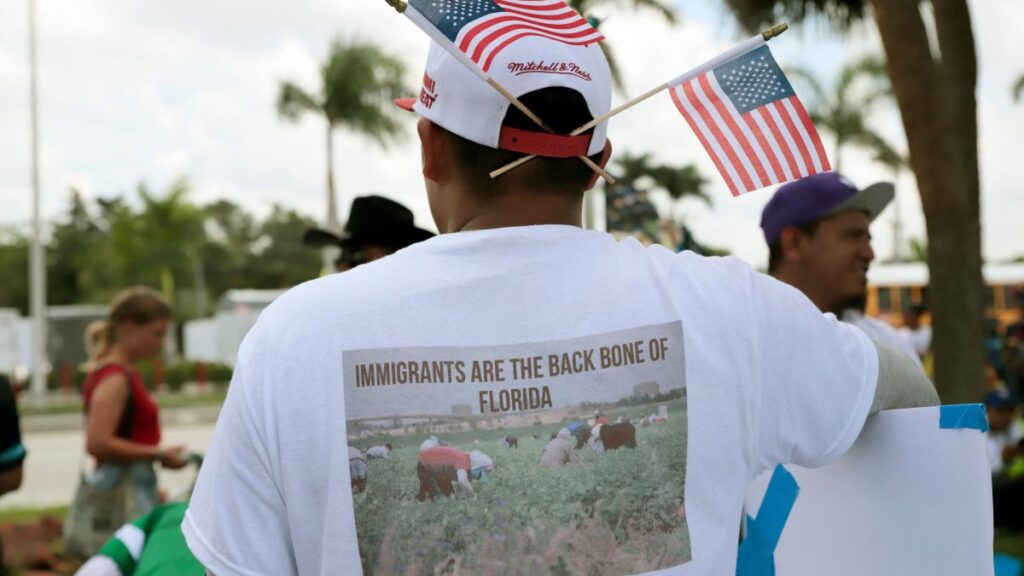TALLAHASSEE — Florida and the federal government clashed in an appeals court this week over whether the state can legally challenge a Biden administration policy that led to the release of illegal immigrants from custody.
Lawyers for both sides filed briefs late Monday with the 11th Circuit Court of Appeals. Gov. Ron DeSantis and Florida Attorney General Ashley Moody have been in the spotlight for criticizing the Biden administration's handling of immigration issues, but the U.S. Supreme Court ruled last year that Texas and Louisiana have certain immigration restrictions. The court ruled that there was no legal standing to challenge the policy.
In light of the Supreme Court's ruling, an Atlanta-based appeals court ordered Florida and the federal government to submit briefs on whether the state has standing to challenge its so-called “parole” policy.
Moody's lawyers wrote that the Supreme Court case does not preclude Florida's challenge. That's largely because the Texas and Louisiana cases focused on issues related to immigrant arrests, while the Florida case involves parole for people already in custody.
The state's brief (page 35) states, “The Texas (Texas-Louisiana case) involved historic discretion of the executive branch to enforce federal law.'' “But the policy at issue here is not simply a failure to enforce the law; instead, it provides temporary legal status in the form of parole and other statutory benefits.”
But lawyers for the U.S. Department of Justice said in a 34-page brief that such distinctions are “immaterial” and that both cases “relate to discretionary policy.”
“Here, DHS (Department of Homeland Security) parole policy is a decision regarding how to best utilize limited resources to process and detain noncitizens who have entered the United States illegally during a specific period of time. ,” the Justice Department brief said.
Florida filed a lawsuit in September 2021 challenging the Biden administration's policies. The case ultimately led to two rulings last year by U.S. District Judge T. Kent Wetherell that found the policies known as “parole plus detention alternatives” and “conditional parole” to be in violation of federal law.
The Pensacola-based judge issued the decision before the Supreme Court decided on the Texas and Louisiana cases. Justice Department lawyers, who have long argued that Florida lacks legal standing, took the dispute to an Atlanta-based appeals court.
Following the Supreme Court's ruling, the Court of Appeals in February directed Wetherell to reconsider whether it had “jurisdiction” in the Florida challenge. The plaintiff must present a position before the judge has jurisdiction to decide the case. Therefore, Wetherell could not have ruled in Florida's favor if Florida had no standing.
Wetherell, a former state appellate judge appointed to the federal bench by former President Donald Trump, quickly issued a ruling upholding an earlier ruling upheld by the state of Florida. Similar to the state's arguments this week, he distinguished the issues in the Florida and Texas cases.
“The policy at issue in these (Florida) cases does not involve arrest or prosecution, but rather allows DHS (U.S. Department of Homeland Security) to comply with the statutory It explains how the “parole” power is exercised. After arriving at the southwest border,” Wetherell wrote. “Nothing in Texas has ruled that a federal court cannot determine the validity of such a non-incarceration/parole policy (Supreme Court opinion).''
Following Wetherell's decision, the Court of Appeal last month ordered additional briefs to be filed.
Florida also argues that its status is preserved because of the costs associated with immigrants coming to Florida. As an example, he said states face additional child education costs.
“The District Court (Wetherell) held that the Department of Homeland Security's policy of allowing mass parole of aliens to Florida not only imposes financial costs on Florida, but also prohibits unauthorized use within Florida's territory and borders.'' “We correctly concluded that this would undermine Florida's quasi-sovereign interests in the presence and movement of aliens,” the state's brief states.
But Justice Department attorneys wrote that Florida “claims indirect injury but has failed to provide sufficient evidence of injury.”
“Following (the Supreme Court’s decision in the Texas v. Louisiana case), states may be able to increase their population through changes in federal policy that could indirectly change state spending on things like driver’s licenses, education, and health care. “It is no longer sufficient to assert that a person or law enforcement agency has committed a crime,” the Justice Department's brief said.
“Establishing a position whenever a federal policy change incurs ancillary costs for each state allows any state to challenge immigration policy changes and obtain desired policy outcomes through federal policy. It would draw courts into unfairly generalized grievances on behalf of states that did not have “political processes.'' ”


